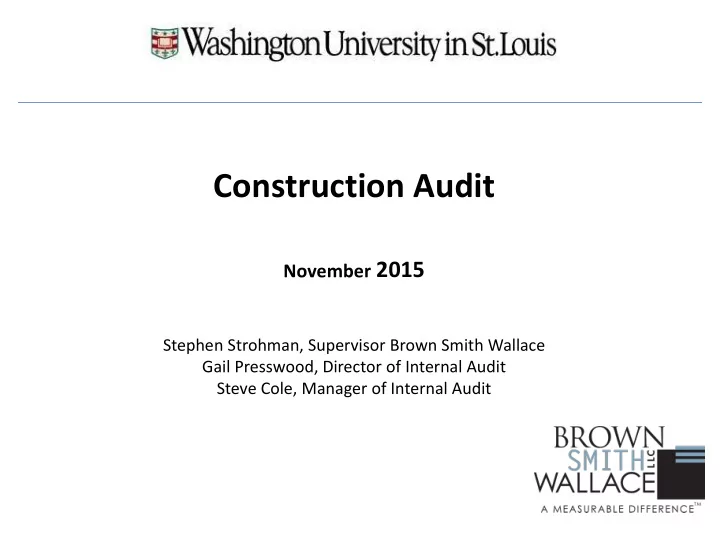

Construction Audit November 2015 Stephen Strohman, Supervisor Brown Smith Wallace Gail Presswood, Director of Internal Audit Steve Cole, Manager of Internal Audit
Agenda • Why Construction Audits • Construction Audit Phases • Contracts • Pay Applications • Closing 2
Construction Audits • Assist project team • Identify and help manage risk • Provide feedback on contract and controls • Help control project costs • “Third line of defense” in construction projects 3
Construction Audit Phases Construction audits usually follow duration of the construction project. • Planning/Pre-construction Review bidding, contract, and set expectations Benefits: - Mitigates contract risks - Cost avoidance - Provides advice from past experiences • Construction Risk assessment & contractor billing review Benefits: - Identifies overspend timely - Raises awareness and transparency • Close-out Evaluate total costs, and verify key contract requirements Benefits: - Ensures contract compliance and deliverables 4
Contract and Bid Review • CSI code breakout • Contract dates vs project schedule • Self-performed work • Percentage completed • Overhead, profit and general conditions • Department request for change • Bid and performance bonds • Washington University contract - subcontractor terms • Exhibits and Appendices 5
Change Orders • Markup calculation template • Credit for project changes • Approval before work begins • Best practices – Utilize University labor rates – Timeliness from Contractor and University – What to look for PM vs. Accountant 6
Labor • Staff labor • Trade labor • Duplicate charges 7
Materials • Sales tax • Warehouse charges • Purchased equipment • Substandard materials or substitutions • Exercise #1 – Duplicate charges – Old vendor invoices – Invoices for another project – Discounts 8
Equipment • Reasonable rental rates • Equipment values • Exercise #2 – Independence of the third-party vendor – Calculation accuracy – Usage vs. time on-site 9
Insurance • Compliance to contract terms – Certificate of Insurance – Purchased coverage – Expiration dates – Waiver of subrogation and additional insured sections • Builders risk • Property insurance • Subguard program • CCIP 10
Other • Lien waivers • Schedule of values • Reimbursements 11
Closing Questions? Thank you for your time, efforts, and cooperation 12
Recommend
More recommend